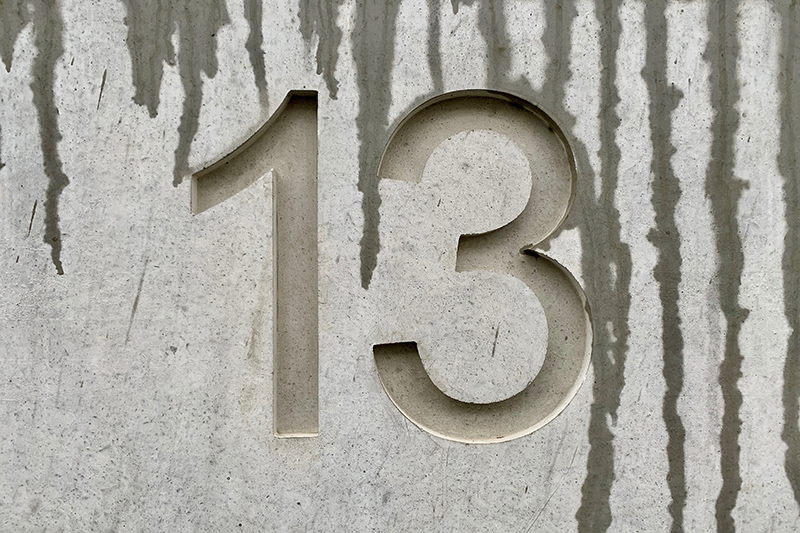Would you think it weird if I refused to travel on Sundays that fall on the 22nd day of the month? How about if I lobbied the homeowner association in my high-rise condo to skip the 22nd floor, jumping from the 21st to 23rd?
It’s highly unusual to fear 22 – so, yes, it would be appropriate to see me as a bit odd. But what if, in just my country alone, more than 40 million people shared the same baseless aversion?
That’s how many Americans admit it would bother them to stay on one particular floor in high-rise hotels: the 13th.
According to the Otis Elevator Co., for every building with a floor numbered 13, six other buildings pretend to not have one, skipping right to 14.
Many Westerners alter their behaviours on Friday the 13th. Of course bad things do sometimes happen on that date, but there’s no evidence they do so disproportionately.
The source of 13’s bad reputation – ‘triskaidekaphobia’ – is murky and speculative. The historical explanation may be as simple as its chance juxtaposition with lucky 12. Joe Nickell investigates paranormal claims for the Committee for Skeptical Inquiry, a nonprofit that scientifically examines controversial and extraordinary claims. He points out that 12 often represents “completeness”: the number of months in the year, gods on Olympus, signs of the zodiac and apostles of Jesus. Thirteen contrasts with this sense of goodness and perfection.
The number 13 may be associated with some famous but undesirable dinner guests. In Norse mythology, the god Loki was 13th to arrive at a feast in Valhalla, where he tricked another attendee into killing the god Baldur. In Christianity, Judas – the apostle who betrayed Jesus – was the 13th guest at the Last Supper.
But the truth is, sociocultural processes can associate bad luck with any number. When the conditions are favorable, a rumor or superstition generates its own social reality, snowballing like an urban legend as it rolls down the hill of time.
Part of 13’s reputation may be connected to a feeling of unfamiliarity, or “felt sense of anomaly,” as it is called in the psychological literature. In everyday life, 13 is less common than 12. There’s no 13th month, 13-inch ruler, or 13 o’clock. By itself a sense of unfamiliarity won’t cause a phobia, but psychological research shows that we favour what is familiar and disfavour what is not. This makes it easier to associate 13 with negative attributes.
Then there are the potent effects of social influences. It takes a village – or Twitter – to make fears coalesce around a particular harmless number. The emergence of any superstition in a social group – fear of 13, walking under ladders, not stepping on a crack, knocking on wood, etc. – is not unlike the rise of a “meme.” Although now the term most often refers to widely shared online images, it was first introduced by biologist Richard Dawkins to help describe how an idea, innovation, fashion or other bit of information can diffuse through a population. A meme, in his definition, is similar to a piece of genetic code: It reproduces itself as it is communicated among people, with the potential to mutate into alternative versions of itself.
The 13 meme is a simple bit of information associated with bad luck. It resonates with people and then spreads throughout the culture. Once acquired, this piece of pseudo-knowledge gives believers a sense of control over the evils associated with it.
Groups concerned with public relations seem to feel the need to kowtow to popular superstitions. Perhaps owing to the near-tragic Apollo 13 mission, NASA stopped sequentially numbering space shuttle missions, dubbing the 13th shuttle flight STS-41-G. In Belgium, complaints from superstitious passengers led Brussels Airlines to revamp its logo in 2006. It had been a “b”-like image made of 13 dots. The airline added a 14th. Like many other airlines, its planes’ row numbering skips 13.
Because superstitious beliefs are inherently false, they are as likely to do harm as good – consider health frauds, for example. I’d like to believe influential organisations – perhaps even elevator companies – would do better to warn the public about the dangers of clinging to false beliefs than to continue legitimising them.
Barry Markovsky is Distinguished Professor Emeritus of Sociology, University of South Carolina. This article is republished from The Conversation under a Creative Commons licence







Click here to change your cookie preferences